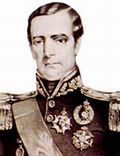 |
Francisco de Lima e Silva
b. 8 Jul 1785, Rio de Janeiro
d. 2 Dec 1853, Rio de Janeiro |
| Title: |
Membro da Regência Provisória (Member of the Provisional Regency) |
| Term: |
7 Apr 1831 - 18 Jun 1831 |
| Term: |
7 Apr 1831 - 18 Jun 1831 |
| Chronology: |
7 Apr 1831, elected by the General Assembly (the Senate and the Chamber of Deputies meeting jointly), held at the seat of the Senate, Rio de Janeiro; oath of office taken at the same meeting |
| |
18 Jun 1831, term of the Provisional Regency expired with the installation of the Permanent Regency |
| Title: |
Membro da Regência Permanente (Member of the Permanent Regency) |
| Term: |
18 Jun 1831 - 12 Oct 1835 |
| Chronology: |
17 Jun 1831, elected by the General Assembly (the Senate and the Chamber of Deputies meeting jointly), held at the seat of the Senate, Rio de Janeiro |
| |
18 Jun 1831, oath of office taken before the General Assembly (the Senate and the Chamber of Deputies meeting jointly), held at the seat of the Senate, Rio de Janeiro |
| |
12 Oct 1835, functions of regents expired with the installation of a sole regent |
| Names/titles: |
Given the title of Barão de Barra Grande (baron of Barra Grande) [18 Jun 1845], but officially refused to accept it. |
| Biography: |
The son of a prominent military officer, Francisco de Lima e Silva entered the military service as a cadet of the Bragança regiment and was promoted to lieutenant in 1799. Raising to the rank of colonel, Lima e Silva commanded a battalion during the suppression of a revolution in Pernambuco in 1824 and served as interim president of the Province of Pernambuco. After the war with the United Provinces of the Río de la Plata, Lima e Silva was appointed military governor of the Province of São Paulo (5 Sep 1828 - 5 Nov 1829, 9 Dec 1830 - 19 Mar 1831) and interim military governor of the Court and the Province of Rio de Janeiro (5 Dec 1829 - 9 Dec 1830). On 7 Apr 1831 Lima e Silva read out the abdication of Emperor Pedro I to the General Assembly. As a representative of the Brazilian military, Lima e Silva was elected a member of the Provisional Regency and then Permanent Regency. He chaired the meetings of the Permanent Regency as president by age. At the time of death of João Bráulio Muniz (20 Sep 1835), José da Costa Carvalho had retired without resigning and refused to rejoin Lima e Silva. The Senate voted to call the General Assembly to elect a replacement for Muniz, but the Chamber of Deputies voted "no"; thus Lima e Silva acted de facto alone from 20 Sep 1835 to 12 Oct 1835. In 1837 Lima e Silva was elected senator for the Province of Rio de Janeiro. [1; 2] |
| Elections: |
| First ballot (7 Apr 1831) [3] |
1st vote |
2nd vote |
| Marquês de Caravelas |
22 |
40 |
| Nicolau Pereira de Campos Vergueiro |
14 |
|
| Second ballot (7 Apr 1831) [3] |
|
|
| Nicolau Pereira de Campos Vergueiro |
19 |
30 |
| Francisco de Paula Almeida e Albuquerque |
7 |
29 |
| Third ballot (7 Apr 1831) [3] |
|
|
| Francisco de Paula Almeida e Albuquerque |
17 |
|
| Francisco de Lima e Silva |
16 |
35 |
| Candidate |
Vote (17 Jun 1831) [2] |
| Francisco de Lima e Silva |
81 |
| José da Costa Carvalho |
75 |
| João Bráulio Muniz |
49 |
| Pedro de Araújo Lima |
35 |
| Antônio Carlos Ribeiro de Andrada Machado e Silva |
27 |
| Marquês de Caravelas |
17 |
| Nicolau Pereira de Campos Vergueiro |
6 |
| Diogo Antônio Feijó |
3 |
|
| |
| [1] |
"Brigadeiros e Generais de D. João VI e D. Pedro I" (Rio de Janeiro, 1938). |
| [2] |
"A Political History of the Brazilian Regency 1831-1840", by Helen Katherine Reinhart, Thesis (University of Illinois, Urbana 1960). |
| [3] |
Dicionário do voto (2000) |

